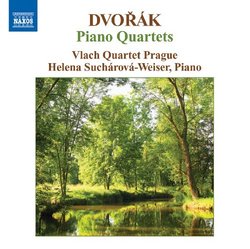True Bohemian Flavor
J Scott Morrison | Middlebury VT, USA | 12/24/2009
(5 out of 5 stars)
"I grew up in a town that had been settled by Bohemians (Czechs) and many people in my town still spoke Czech at home. Bohemian music was heard everywhere. My first piano teacher was herself Czech and much of the music I learned in my early years was Czech. Consequently although I am not myself of Czech descent the music of that country is in my blood and bones. Consequently when I hear music by composers like Dvorák, Smetana, Suk, Janácek and the like I tend to listen for Czech inflections. Much as I like the Beaux Arts Trio's recording (with Walter Trampler) of Dvorák's two wonderful piano quartets there is just the last little bit of Bohemian-ness missing. The present CD is played by four Czech musicians. They are three members of the Vlach Quartet Prague along with pianist Helena Suchárová-Weiser. And the first violinist is Jana Vlachová, daughter of violinist Josef Vlach, founder of the Vlach Quartet, one of the great Czech string quartets of yesteryear.
Dvorák wrote two delightful piano quartets. The First Quartet, Op. 23, was written in 1875. Of the two quartets it is the most obviously influenced by Bohemian folk music (although there is also a good deal of influence from Schubert and indeed there is a piano figure in the first movement that always reminds me of an almost identical figure in Schubert's 'Trout' Quintet). The quartet is in three movements. The first movement opens with a quintessentially Czech melody played by the cello and it is taken up at length (through several key changes) by first the violin and then the piano. The development is unusual in that it leads to two false recapitulations before finally getting back to the home key of B flat. The middle movement is a set of five variations on a lovely melody. The finale is actually a 3/8 scherzo, Allegretto scherzando, and a 4/4 finale, Allegro agitato, combined. The whole quartet is charming, folk-influenced and invigorating. It is probably not as often played as the more serious Second Quartet and I wonder if that is because it could be felt to be lightweight. But it is quintessential Dvorák and it is played by the present musicians with great joy and subtlety.
The Second Piano Quartet in E Flat, Op. 87, was written fourteen years later, in 1889. One can hear the changes in Dvorák's style in that the construction is more complex, the harmonies more sophisticated, the impact more muscular and dramatic. It opens with a minatory unison theme that sets the tone for the first movement. The second movement, Lento, is in the unusual key of G Flat Major and is predominantly lyrical, musing. There is a dramatic section in the even more unusual key of C Sharp Minor that then changes to D Flat Major before the music moves through an F Sharp Minor section and then on to its original key for a songful finish. I mention these key signatures because they represent an example of the maturing of Dvorák's musical thinking. Only a completely assured composer would be able to bring these key changes off as if they were the most natural thing in the world. The third movement is a quintessentially Bohemian waltz that has some traces of orientalism in its second section. The finale is a fairly straightforward sonata-allegro that nonetheless sounds almost like folk music. There is no question that the Second Quartet is one of Dvorák's masterpieces.
The musicians on this disc are masters of the Czech style. The lilting rhythms of Bohemian dances and the always innocent-sounding if melancholy melodies are played in their native language. Of CDs that contain these two quartets I prefer this one to those of the Beaux Arts Dvorák: Piano Quartet No. 1; Piano Quartet No. 2 [Australia] or the slightly restrained Domus Dvorák: Piano Quartets, and it is at an attractive budget price.
Timing: 71:11
Recommended.
Scott Morrison"

